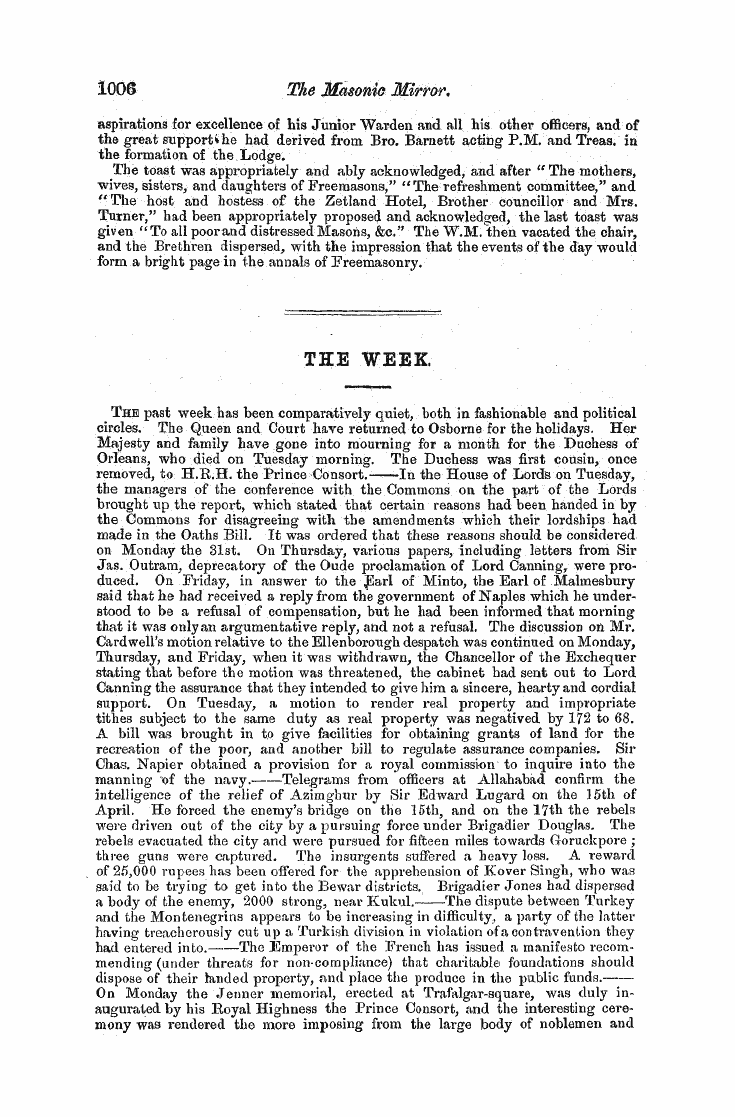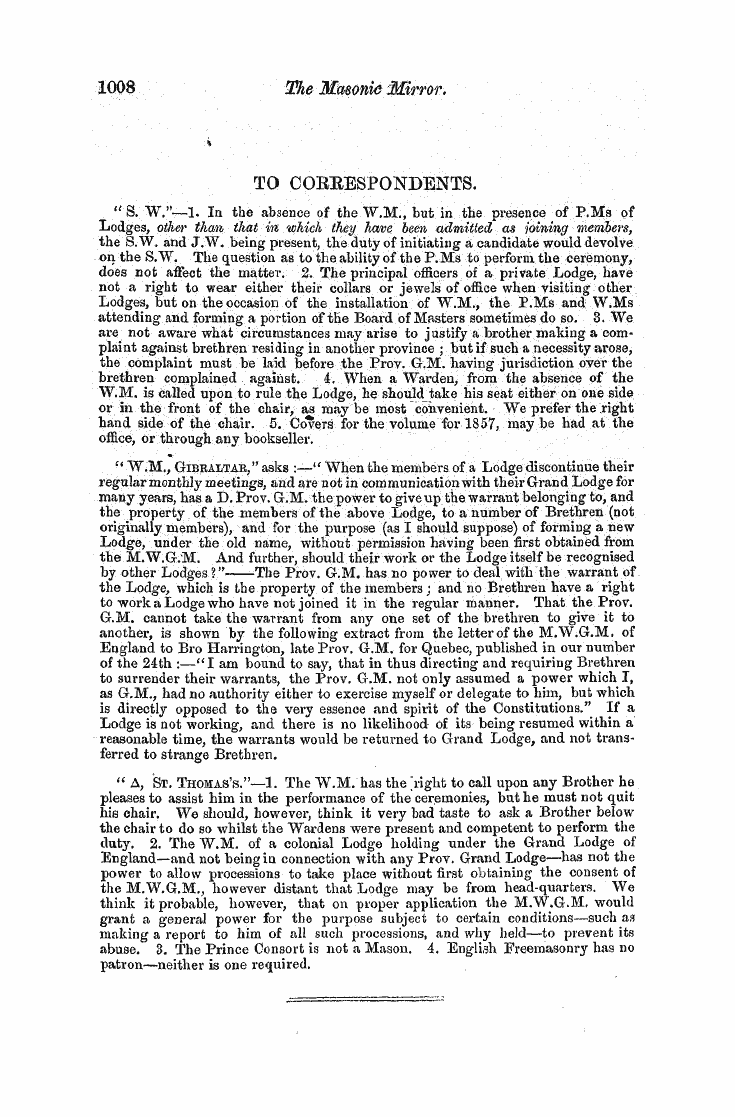-
Articles/Ads
Article ¦ UMFOBMITY OE WORKING. ← Page 2 of 6 →
Note: This text has been automatically extracted via Optical Character Recognition (OCR) software.
¦ Umfobmity Oe Working.
serving the authorised mode of working ; and . ' . public nights were specially set aside to enable the Brethren to attend and see what that working was . If that were the object of the establishment of the Grand Stewards' Lodge , it should have been so declared in the Book of Constitutions ; and then it would be looked to and followed as an
authority . But m order to make it such an authority it must be altogether re-constituted ; the Grand Stewardship must be made an honorary office conferred upon Brethren to be chosen for their Masonic lore and their power of imparting instruction , and not depending upon the fact that they belong to certain Lodges and are enabled to disburse some fifteen or twerity pounds for the distinction of wearing a red apron instead of a blue ; and , moreover , it must be
compulsory on those Brethren to become members , for at least a certain time , of the Grand Stewards' Lodge ^ the expenses of which should be so arranged as not to press unduly on their pockets . Without some such arrangement never be looked upon to any extent as an authority ; and that it is not generally so considered is evident from the miserably thin attendance which now graces its public nights . Not anticipating that
any such sweeping reform is likely to take place within our time—it becomes us ( and we use the word " us " not editorially onl y > but as representatives of the whole Craft , as the subject has become one of considerable importance to the welfare of the institution ) so to bring our opinions to bear upon it , that ere long uniformity may be established , and the discordance to which we have alluded no longer
exist . It may not be known to all of our younger and country readers that the two systems go by the names of their promulgators , Peter Gilkes and Peter Thomson . The system of the former at the time when we first entered into Freemasonry was much more extensively
worked in the metropolis ( and here we may say en passant that we believe that it still generally prevails in the country ) than the latter ; but chiefly through the great energy and indefatigable exertions of Brother Henry Muggeridge , the successor of Brother Thomson , his system has of late come into more extensive practice .
Twelve months since it was announced at the anniversary of the Stability ( Thomson ) Lodge of Instruction , in the presence of Bro , Muggeridge and Bro . Stephen Barton Wilson , the acknowledged head of the Emulation ( Gilkes ) Lodge of Instruction , that arrangements were making for the adoption of one uniform system of working ; and as late as a fortnight since , Bro . Havers , presiding at another anniversary of the same Lodge , repeated the statement of the preceding year . Now , we may be allowed to ask why the
settlement of such matters should require two years for arrangement . Is it because the parties entrusted with the duty are too wedded to their own peculiar theories to enable either lo give way to the other ? We suspect there must be some such feeling in existence—for , after all , what are the differences to he settled ? They may be resolved into a very small compass , viz . the position of the
Note: This text has been automatically extracted via Optical Character Recognition (OCR) software.
¦ Umfobmity Oe Working.
serving the authorised mode of working ; and . ' . public nights were specially set aside to enable the Brethren to attend and see what that working was . If that were the object of the establishment of the Grand Stewards' Lodge , it should have been so declared in the Book of Constitutions ; and then it would be looked to and followed as an
authority . But m order to make it such an authority it must be altogether re-constituted ; the Grand Stewardship must be made an honorary office conferred upon Brethren to be chosen for their Masonic lore and their power of imparting instruction , and not depending upon the fact that they belong to certain Lodges and are enabled to disburse some fifteen or twerity pounds for the distinction of wearing a red apron instead of a blue ; and , moreover , it must be
compulsory on those Brethren to become members , for at least a certain time , of the Grand Stewards' Lodge ^ the expenses of which should be so arranged as not to press unduly on their pockets . Without some such arrangement never be looked upon to any extent as an authority ; and that it is not generally so considered is evident from the miserably thin attendance which now graces its public nights . Not anticipating that
any such sweeping reform is likely to take place within our time—it becomes us ( and we use the word " us " not editorially onl y > but as representatives of the whole Craft , as the subject has become one of considerable importance to the welfare of the institution ) so to bring our opinions to bear upon it , that ere long uniformity may be established , and the discordance to which we have alluded no longer
exist . It may not be known to all of our younger and country readers that the two systems go by the names of their promulgators , Peter Gilkes and Peter Thomson . The system of the former at the time when we first entered into Freemasonry was much more extensively
worked in the metropolis ( and here we may say en passant that we believe that it still generally prevails in the country ) than the latter ; but chiefly through the great energy and indefatigable exertions of Brother Henry Muggeridge , the successor of Brother Thomson , his system has of late come into more extensive practice .
Twelve months since it was announced at the anniversary of the Stability ( Thomson ) Lodge of Instruction , in the presence of Bro , Muggeridge and Bro . Stephen Barton Wilson , the acknowledged head of the Emulation ( Gilkes ) Lodge of Instruction , that arrangements were making for the adoption of one uniform system of working ; and as late as a fortnight since , Bro . Havers , presiding at another anniversary of the same Lodge , repeated the statement of the preceding year . Now , we may be allowed to ask why the
settlement of such matters should require two years for arrangement . Is it because the parties entrusted with the duty are too wedded to their own peculiar theories to enable either lo give way to the other ? We suspect there must be some such feeling in existence—for , after all , what are the differences to he settled ? They may be resolved into a very small compass , viz . the position of the

































































































































































































